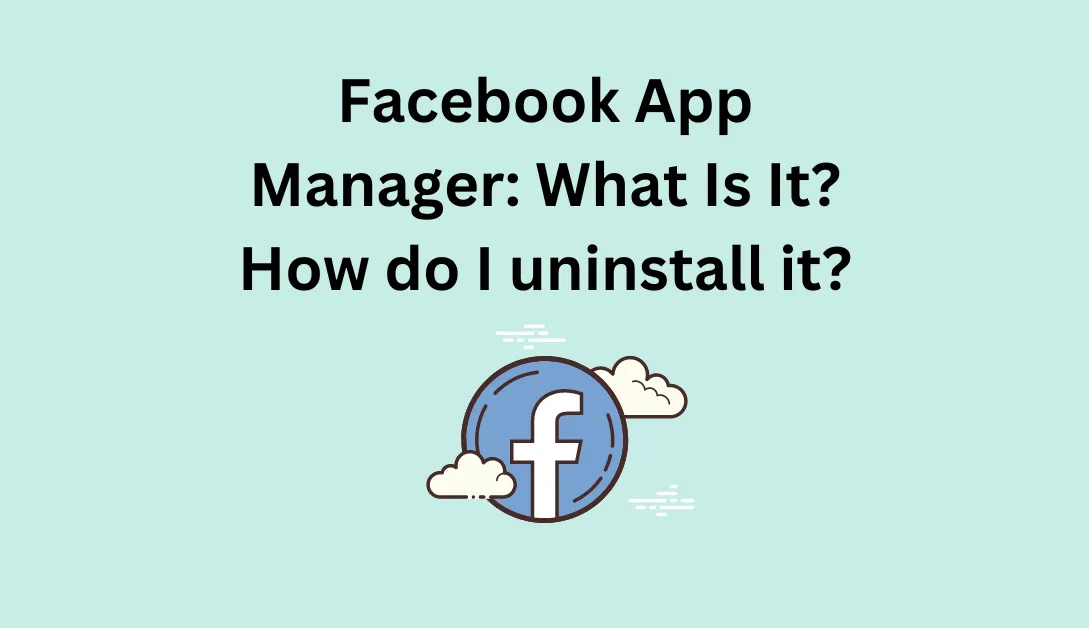If you have an Android phone, you can see Facebook App Manager among the most recently used apps by looking at the Google Activity log. Com. facebook.appmanager is always listed among the most recently used applications if you use Facebook.
As a result, consider whether you need it and what it is. You should also uninstall it.
By outlining what com Facebook app manager is, its function on smartphones, and how to go about the deletion process, this article helps to clear the air and set the record straight. After paying attention and reading the article for a few minutes, you can fully understand the app.
What is the purpose of the Facebook app manager?
Your smartphone, whether it runs on an iPhone or a Google Operating System, has a variety of applications, including mobile service manager, many of whose features you might need to fully comprehend, and the Facebook App Manager is one of them.
Given that it is absent from the main menu, it might not be a useful application. However, as implied by its name, it is closely related to the Facebook app.
To put it simply, the com.facebook.appmanager is a group of package files associated with Facebook whose purpose is to improve a user’s experience while Facebooking.
The Facebook.app.manager and com.facebook.katana are just two of the numerous tiny programs or package files that support the Facebook app’s functionality.
Maintaining the Facebook apps, such as Instagram, Messenger, and Facebook itself, up to date also contributes to an improved user experience.
The Facebook App Manager implements the updates to keep the aforementioned apps operational when they are periodically released. Additionally, it detects crashes and alerts the Facebook servers for prompt action to prevent crashes from occurring.
READ ALSO: Verizon Sim Card Not Working: How to Fix this Error
Why would someone use the Facebook App Manager?
You might be shocked to see how many apps are installed on your device after viewing Google’s Activity log. Additionally, certain apps, such as the Facebook dating app and Facebook App Manager, are missing from the main menu, and I wonder what functions they serve on an Android phone.
Interestingly, the app works well on Android phones and tablets. Consider what would occur if the Messenger and Instagram apps needed to be updated. Of course, some functions would be jeopardized, which would be disastrous.
And if that needed to be better, the app would cause the crashes it detects and stops from happening. As a result, you would want to avoid Facebook and its associated applications experiencing a system crash or Facebook Messenger issues.
Additionally, the app manager aids the user in having complete control over each activity on the application page. Ads, videos, and Facebook’s menu for home, friend requests, notifications, etc., are all included in this.
SEE ALSO: What Is Mobile Installer Android?
Is the Com.facebook.appmanager necessary for your Android device?
Is a device required to have the Facebook app manager? This is another question that many people have. Of course, your phone can function without App Management.
It does, however, require the system application to run properly. As previously stated, the quality of your Facebook experience will depend on how well-maintained the app’s manager is.
Is Facebook.app.manager a virus or is it safe?
We are happy to address many people’s concerns regarding the Facebook App Manager being a virus similar to Omacp. These files don’t contain viruses, and they won’t spread them to your smartphone, either.
You’ll be happy to learn that the manager is free of bloatware and malware. As a result, it only uses up necessary phone storage space or partially fills up your device.
ALSO READ: What is RoseEukor App on Android?
What are the Com. facebook. appmanager’s most frequent problems?
A few things could be improved with the com.facebook.appmanager, just like with any other app or package file on your Android phone. It would help if you kept in mind that the package files for this app management consume additional battery life while running in the background.
Your phone needs to be charged more frequently the more the battery is depleted. In addition, the files consume storage space and memory like any other app.
What takes place if I turn off Facebook App Manager?
People may feel the urge to disable the latter when they realize they have numerous apps on their smart devices but are not using some of them. As a result, some of our customers have questioned whether it’s a good idea to delete the Facebook App Manager and whether it can be done.
You can disable or remove the Facebook app manager, but how easily you can do so depends on whether you downloaded the Facebook app or if it was preinstalled on your phone.
When you delete Facebook, the former app is automatically deleted as well. To remove the com.facebook.appmanager, you will need root access if the app was preinstalled on your android phone.
The straightforward response is that the decision to delete the app manager is entirely up to you. However, keep in mind that deleting the app Manager means you won’t get the most recent updates for Instagram, Facebook, and Messenger, and you won’t have control over most of your Facebook page activities.
READ: What Is LG IMS App?
How to Remove the Facebook App Manager from an Android Device
Use one of the three methods below to remove the Facebook App Manager from your Android device. The following instructions can assist you in doing so.
Step 1: Uninstalling using the settings menu
Because Facebook not preinstalled on the phone when you purchased it, this option will work particularly well if you download it. Hold down on the app for a long time and choose the ‘Uninstall’ option from the short menu that appears.
Alternatively, you can click on Facebook in the Apps menu under Settings and choose “Uninstall” from the menu that appears. Automatic removal of the com.facebook.appmanager will take place.
SEE : What Is Com.facebook.katana App
Step 2: Use a system app remover.
The system application remover technique is another way to remove the app. It is typically used when the Android phone has the app preinstalled in it and also requires root access.
To learn how to gain root access to your phone, refer to the Android Rooting Guide. Once finished, carry on as follows;
- Download the System Application Remover and install it.
- Searchcom.facebook.appmanager, and choose “Uninstall‘ to permanently delete it.
Step 3: Try Debloater Tool.
The Debloater Tool software will clean your Android device of unnecessary files and the Facebook App Manager. Some preinstalled apps on your phone use up valuable storage space and are unnecessary.
You can only remove many of these programs without having root access. However, they can eliminated without root access using the Debloater Tool. You must download the Debloater Tool and connect your phone to your PC.
- After you’ve launched the Debloater Tool,
- Locate the device manager.
- Find the name of your device.
- Scroll down until you find “com. facebook.appmanager” under the “Packages” tab.
- Finally, click “Apply” after selecting “Disable” next to the package name.
Your modifications will take effect immediately, and the Facebook App Manager tool will no longer be available on your device.
READ ALSO: “Mobile Network State Disconnected” How to Fix It?
Summary.
If you have an Android phone, you can see Facebook App Manager among the most recently used apps by looking at the Google Activity log. It is closely related to the Facebook app, and its purpose is to keep the Facebook app up to date when new features are released. Com.facebook.appmanager is free of bloatware and malware and doesn’t use up unnecessary storage space or fill up your device.
The Com.Facebook.app Manager will not cause a system crash or Facebook Messenger issues if it’s well-maintained. How to remove the Facebook App Manager from an Android device. Use one of the three methods listed below to remove it from your phone. The Debloater Tool will clean your Android device of unnecessary files and the app. You must download the tool and connect your phone to your PC.








